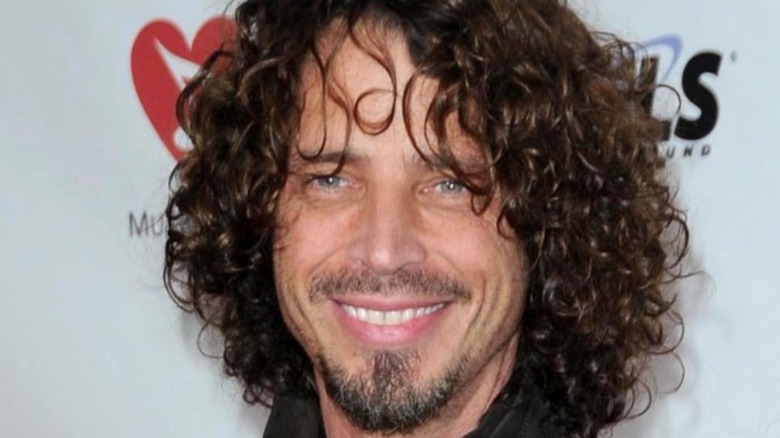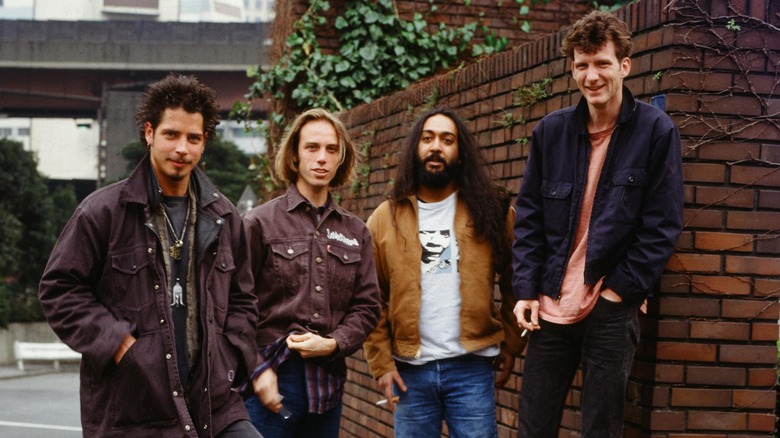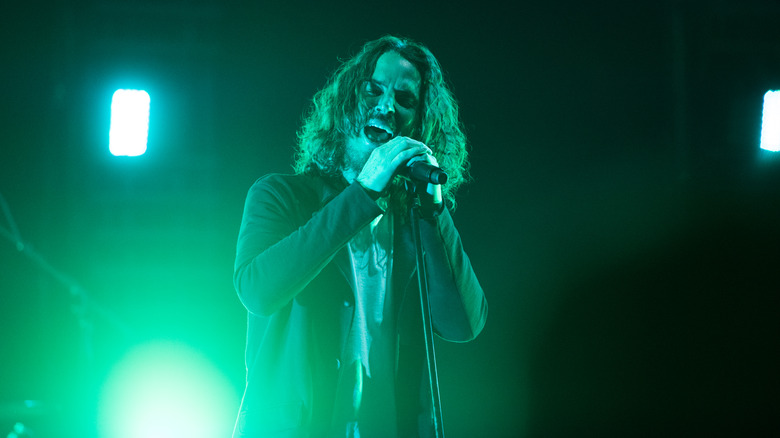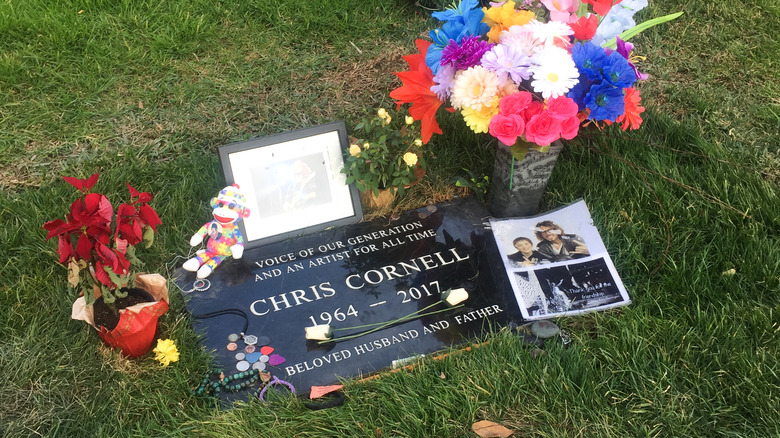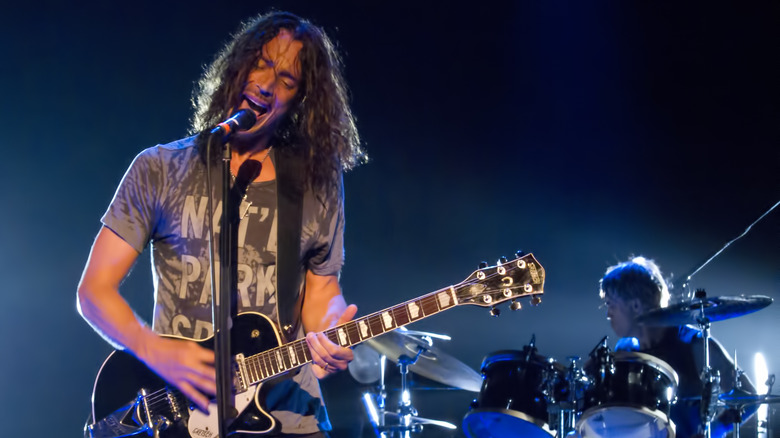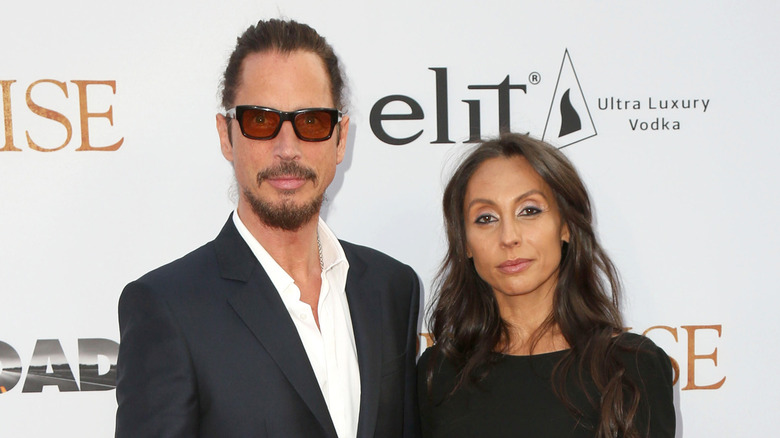Tragic Details Found In Chris Cornell's Autopsy Report
Chris Cornell started his music career in the mid-'80s with Soundgarden. The band was one of the pioneers in the grunge scene in Seattle, along with Nirvana, Pearl Jam, and Alice in Chains. Throughout the years, Cornell also collaborated with other musicians and released his first solo album titled "Euphoria Morning" in 1999, as reported by All Music.
His interest in music started at an early age, and he got his first drum kit when he was 15 years old. According to the musician, his mother bought him a snare drum, and he purchased the rest of the drumkit soon after. "My mom was ecstatic because it was the first thing I'd done on my own which wasn't illegal or troublesome," he said in an interview with Louder Sound. Cornell eventually dropped out of school to pursue a music career, and he worked at the docks and in restaurants to support himself while performing small gigs at night.
The success of Soundgarden
Soundgarden was formed in 1984, and as Chris Cornell recalled, the band was not an instant hit. "People hated us in the beginning. I'd come on stage with no shirt on, whipping my hair around and generally being a sweaty rock guy," he told Louder Sound. The band released the demo "6 Songs for Bruce" in 1985, and three years later, the studio album "Ultramega OK" debuted. Soundgarden was well known in the Seattle grunge scene, but it wasn't until their 1994 album "Superunknown" that they gained worldwide fame.
"Black Hole Sun" is the third single from "Superunknown," and it has become one of the band's most popular songs. It spent seven weeks at the No. 1 position on the Billboard Mainstream Rock Tracks chart, and reached Top 10 positions in different countries as well, as reported by DBpedia. Cornell wrote "Black Hole Sun" in his basement, and initially, the band had doubts about whether or not it was "a Soundgarden song." It was different from the songs they had previously released, but eventually, the band decided to go with it. In 1995, Soundgarden took home a Grammy award for Best Hard Rock Performance for "Black Hole Sun."
Chris Cornell's death
In 2017, Soundgarden went on a U.S. tour after a lengthy hiatus. They had just performed a show at the Fox Theatre in Detroit, Michigan, but little did they know that it would be their last performance with Cornell.
Shortly after the concert, Cornell headed back to his room at the MGM Grand Detroit hotel and called his wife, Vicky. According to ATI, Vicky asked Cornell what he took after noticing that he was slurring, to which the musician answered, "an extra Ativan or two." Later that night, Vicky requested Cornell's bodyguard, Martin Kirsten, to check on her husband. Kirsten headed to Cornell's room and found the door locked. He kicked it open and found an unresponsive Cornell inside the bathroom. Help was immediately called and responders attempted to revive him, but it was too late; Cornell was pronounced dead at 1:30 a.m. on May 18, 2017. He was 52 years old.
Friends and fans paid tribute to Chris Cornell
News of Chris Cornell's death quickly spread, and fans were devastated. Tributes on social media quickly poured, and his wife, Vicky said, "Chris's death is a loss that escapes words and has created an emptiness in my heart that will never be filled," (via Rolling Stone). Cornell's brother, Peter, also penned a tribute on Facebook and called his brother an icon and a legend. "Artists, actors, musicians. We rely on these people to lift us up. To inspire us and distract us in times of trouble. Chris protected us when we needed him to. His one of a kind-ness surrounded us like a suit of armor. He was a warrior and a wizard. A howling wolf and a trusted mentor." He also attached two photos — one of them as children, and the other was the last photo taken of them together.
Cornell's friends from the music industry mourned his death. Elton John called him the "loveliest man," Jimmy Page said that he was "incredibly talented," and Tony Iommi said that Cornell was one of his favorite singers and was "a lovely person" (per Spin). A private memorial service that was attended by friends and family was held at the Hollywood Forever Cemetery, and his gravesite was opened for public viewing afterward. Hundreds of fans flocked to the cemetery to pay their final respects to Cornell.
Chris Cornell's autopsy
According to the official autopsy report (via Autopsy Files), Chris Cornell's official cause of death was hanging with a resistance exercise band, and his manner of death was suicide. There were no other injuries found on Cornell's body except for the ligature mark on his neck. Toxicology tests were also done, and the results revealed that he had drugs in his system including naloxone, butalbital, lorazepam, norpseudoephedrine, caffeine, and pseudoephedrine. However, the medical examiner noted that the ingestion of said drugs did not contribute to Cornell's cause of death.
Cornell's wife, Vicky, stated that her husband struggled with drug addiction and was on prescription medication at the time of his death. She believes that the musician wasn't in his right state of mind when he killed himself. "My husband was the furthest thing from a rock star junkie. He just wasn't," she said in an interview, as reported by Time. Vicky also spoke of how wonderful Cornell was as a father and that he never would have left his children if he was thinking clearly.
The lawsuit against Chris Cornell's doctor
In 2018, Vicky Cornell filed a lawsuit against Chris Cornell's doctor, Robert Koblin. Vicky stated that her husband's doctor was negligent in prescribing him drugs, particularly lorazepam (Ativan), which Cornell had been taking for almost two years at the time of his death. The lawsuit stated that Dr. Koblin prescribed "dangerous mind-altering controlled substances to Chris Cornell which impaired Mr. Cornell's cognition, clouded his judgment, and cause him to engage in dangerous impulsive behaviors that he was unable to control, costing him his life" (via USA Today). Vicky said that Dr. Koblin was aware of Cornell's history of addiction, and he should have controlled the dosage he prescribed to the musician.
Dr. Koblin responded to the lawsuit by denying the allegations against him. Both sides reached a settlement in 2021, but the details of the case were kept confidential, per AP News. "After years of litigation and settlement negotiations, Plaintiffs and Defendants ... have reached a confidential settlement agreement to resolve all claims," attorneys for the Cornell family stated.
